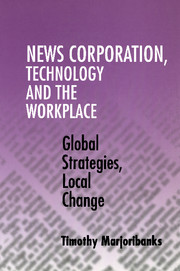Book contents
- Frontmatter
- Contents
- List of Tables and Figures
- Acknowledgements
- Abbreviation
- Introduction: Tales from the Workplace
- Part I Technological Innovation and Workplace Reorganisation: The Newspaper Industry
- 1 Global Technology and the Local Workplace: A Theoretical Debate
- 2 The Institutional and Societal Context: Britain, Australia and the United States
- 3 The Newspaper Industry: Historical Developments in the Three Countries
- Part II Technological Innovation and Workplace Reorganisation: News Corporation
- Bibliography
- Index
1 - Global Technology and the Local Workplace: A Theoretical Debate
Published online by Cambridge University Press: 04 August 2010
- Frontmatter
- Contents
- List of Tables and Figures
- Acknowledgements
- Abbreviation
- Introduction: Tales from the Workplace
- Part I Technological Innovation and Workplace Reorganisation: The Newspaper Industry
- 1 Global Technology and the Local Workplace: A Theoretical Debate
- 2 The Institutional and Societal Context: Britain, Australia and the United States
- 3 The Newspaper Industry: Historical Developments in the Three Countries
- Part II Technological Innovation and Workplace Reorganisation: News Corporation
- Bibliography
- Index
Summary
The influence of technology on all aspects of society – on the people, the institutions, and relations within societies – is being both celebrated and criticised in the late twentieth century. Technological developments in computers, telecommunications, satellites and fire optics are proclaimed by many as heralding a new, more productive and economically efficient society. Two areas where the influence of computer technology is particularly prevalent are in the organisation of work and the workplace, and the global expansion of the media and communications industries. Walter Wriston, the former Chair and Chief Executive Officer of the US-based Citibank, has been reported as claiming:
[T]he revolution in information technology is threatening the sovereignty of nation-states. The global economy is an information economy in which information is the most important factor of production of goods and services. Intellectual capital (knowledge and information) is the new source of wealth for nations (not manufactured goods or agricultural products, but information)
(Stephens 1995:20).Commenting on the interaction between technology, the media and world events, Rupert Murdoch, die Chair and Chief Executive of the global media company News Corporation Limited, observed that over a period of thirty years he had witnessed the media playing a fundamental role in liberating nations, and in transforming politics and culture around the world (Murdoch 1993:8).
While an apparent internationalisation of media linked to technological developments has occurred, a globalisation of the world economy has also taken place which is linked fundamentally to the dispersion of computer and other electronic and digital technology (Freeman, Soete and Efendioglu 1995; Lash and Urry 1994).
- Type
- Chapter
- Information
- News Corporation, Technology and the WorkplaceGlobal Strategies, Local Change, pp. 7 - 26Publisher: Cambridge University PressPrint publication year: 2000



